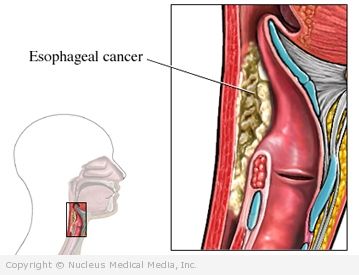Esophageal cancer
Esophageal cancer – Definition
The esophagus is the tube that runs from the mouth to the stomach. Food passes down this tube to the stomach. Esophageal cancer is the growth of cancer cells in this tube.
Cancer occurs when cells in the body divide out of control. If cells keep dividing, a mass of tissue forms. These are called growths or tumors. If the tumor is malignant, it is cancer. They can invade nearby tissue and spread to other parts of the body.
There are two main types of esophageal cancer:
- Squamous cell cancer — from the cells that line the upper part of the esophagus
- Adenocarcinoma — from cells that where the esophagus meets the stomach
Esophageal cancer – Causes
The cause of esophageal cancer is unknown.
Esophageal cancer – Risk Factors
Factors that may increase your chance of esophageal cancer include:
- Age: 60 or older
- Sex: male
- Smoking or smokeless tobacco use (such as chewing tobacco or snuff)
- Alcohol use
- History of gastroesophageal reflux, especially if this has caused Barrett’s esophagus
- Achalasia (chronic dilation of the esophagus)
- Infection with Helicobacter pylori (causes stomach ulcers)
- Certain rare genetic conditions such as Plummer Vinson syndrome and tylosis
- Damaged esophagus from toxic substances, such as lye
- History of cancer of the head and/or neck
- Human papilloma virus (HPV) infection
Esophageal cancer – Symptoms
Symptoms may include:
- Trouble swallowing
- Painful swallowing
- Cough
- Hoarse voice
- Pain in the throat, back, chest
- Nausea, vomiting
- Coughing up blood
- Weight loss
Esophageal cancer – Diagnosis
The doctor will ask about your symptoms and medical history. A physical exam will be done.
Tests may include:
- Chest x-ray — an x-ray of the chest area
- Upper GI series — a series of x-rays of the esophagus and stomach taken after drinking a special solution
- Esophagoscopy — examination of the esophagus using a lighted scope
- Biopsy — removal of a small sample of esophageal tissue to test for cancer cells
- CT scan — a type of x-ray that uses a computer to make pictures of structures inside the body
- PET/CT scans — may be done before surgery to look for spread of the cancer, more sensitive than CT scan
- Bone scan — to see if the cancer has spread to the bones
This type of cancer can spread very early. This can make it difficult to cure. People who have risk factor, especially reflux, should talk to their doctor about screening tests. Screening tests will look for cancer in people before they have any symptoms.
Esophageal cancer – Treatment
Treatment may include:
Surgery
Surgery may be needed to remove the tumor. Your doctor may also need to remove all or part of your esophagus.A plastic tube may be put in place of the missing esophagus.
Radiation Therapy
Radiation is used to kill cancer cells and shrink tumors. Radiation may be:
- External radiation therapy— radiation directed at the esophagus from a source outside the body
- Internal radiation therapy — radioactive materials placed into the esophagus in or near the cancer cells
Chemotherapy
Chemotherapy is the use of drugs to kill cancer cells. Chemotherapy may be given in many forms. It may be pills, injections, and/or catheters.
The drugs will enter the bloodstream and travels through the body. It will kill mostly cancer cells. Some healthy cells may also be killed.
Chemotherapy alone will not cure this type of cancer. It is only used when the cancer has already spread and cannot be cured. At this point it is used to help shrink the tumor, ease pain or control nausea.
Chemoradiotherapy or Combined Modality Therapy
Chemotherapy and radiation therapy together are better than radiotherapy alone. It has also been shown that these two treatments may be as effective as surgery alone.
Trimodality Therapy
This is three step therapy. It includes chemotherapy, radiation therapy and surgery. This has been shown to be a most aggressive form of therapy. It may be the best way to cure a patient of their disease.
Laser Therapy
High-intensity light may be used to try to kill cancer cells.
Photodynamic Therapy
A combination of drugs and special lights are used to try to kill cancer cells. The medication is absorbed into the cancer cells. The special lights stimulate the medication to kill the cancer cells.
This therapy is a promising treatment. It is only appropriate in a very small number of patients. There are limits of how far the infrared light source will travel into the cancer itself. The tumor must be very small. It is also not used in cancer that has spread to any lymph nodes or other structures.
If you are diagnosed with esophageal cancer, be sure to follow your doctor’s instructions.
Esophageal cancer – Prevention
To help prevent esophageal cancer:
- Don’t smoke or use other tobacco products. If you smoke, quit.
- Drink alcohol only in moderation. Moderate alcohol intake is no more than two drinks per day for men and one drink per day for women.
- Get medical treatment for gastroesophageal reflux disease.

